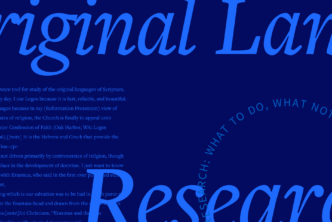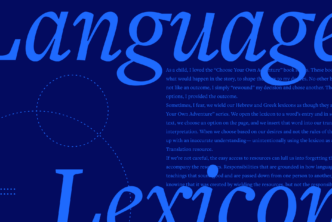Plenty of Bible interpreters treat New Testament Greek the way my three-year-old girl treats my one-year-old boy: with well-meaning, blundering over-attention that ends up making him cry. Evangelical scholar and linguist Moisés Silva has a hilarious little piece in Foundations of Contemporary Interpretation in which he shows what this over-attention looks like by applying it to English (you just have to read it).
People, Silva says, find a lot of meaning that isn’t there in vocabulary, syntax, and verb tenses. They treat Greek like it’s a math problem: they assume that if they plug in the data and turn the crank they’ll get a definitive answer to whatever interpretive question they’re asking. I’ve heard numerous such exegetes say that Greek is the most exact, unambiguous language ever invented.
Μὴ γένοιτο. I do believe that the Bible gives definitive answers to human questions, but I don’t believe that Greek is math. Koine Greek, like Hebrew and English and Swahili and Old Norse, had to be used by regular people (Koine means “common”) who didn’t have vast education and couldn’t hold on to all the fine shades of meaning often supposed to be hidden in Greek. I’m not saying there are no subtle nuances in the Greek New Testament, only that the path to finding them doesn’t end with parsing and case uses.
Here’s my point: you need exegetical tools that will help you remember that you’re dealing with a human language and therefore achieve the level of interpretive certainty the text actually justifies. We cannot forget that good interpretation weighs various factors; it doesn’t just count them.
Let me make a recommendation if you’re learning Greek: your ears are two of your most valuable tools in language acquisition, and they will help you—on an almost subconscious level—to remember that Greek is a genuine human language and not math. Logos includes easy access to Greek audio pronunciations in several key places where you’ll be working as you learn.
And another recommendation: make general study of linguistics, and study of Greek linguistics in particular, part of your Greek study from the beginning. Some resources I and the other Logos Pros recommend:
- I think it’s especially important to learn Greek from someone who knows linguistics in general: David Alan Black’s Learning to Read New Testament Greek fits the bill.
- Faithlife’s own Learn to Use Biblical Greek and Hebrew is one of our most popular products. This course teaches you principles of biblical Hebrew and Greek while teaching you how to use Logos Bible Software.
- Faithlife scholar-in-residence Steve Runge has produced a Discourse Grammar of the Greek New Testament that you should also check out.




